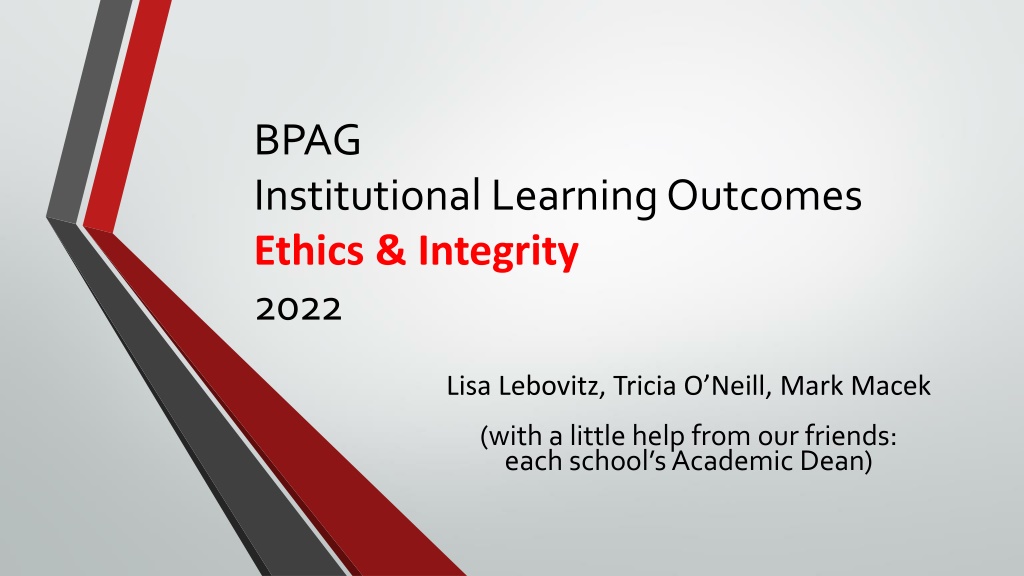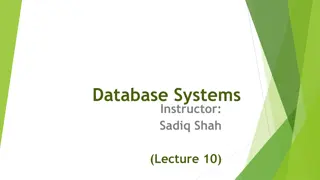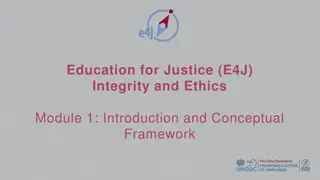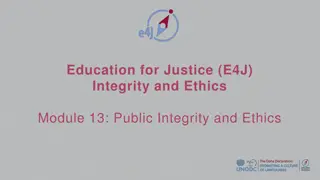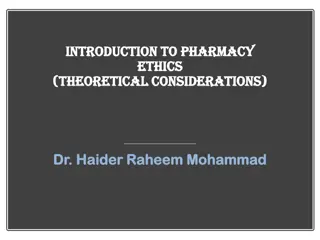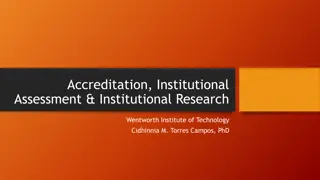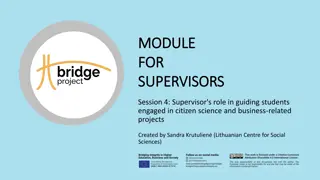Understanding Ethics and Integrity in Educational Institutional Learning Outcomes
Exploring the distinction between ethics and integrity, this content delves into the importance of ethical reasoning and defining terms in the context of Institutional Learning Outcomes (ILOs). It highlights the significance of ethical self-identity and the ability to recognize and address ethical dilemmas. The focus is on developing a foundation of integrity and ethical conduct within educational settings.
Uploaded on Sep 28, 2024 | 0 Views
Download Presentation

Please find below an Image/Link to download the presentation.
The content on the website is provided AS IS for your information and personal use only. It may not be sold, licensed, or shared on other websites without obtaining consent from the author. Download presentation by click this link. If you encounter any issues during the download, it is possible that the publisher has removed the file from their server.
E N D
Presentation Transcript
BPAG Institutional Learning Outcomes Ethics & Integrity 2022 Lisa Lebovitz, Tricia O Neill, Mark Macek (with a little help from our friends: each school s Academic Dean)
Ethics vs Integrity Ethics can be defined as a code of moral principles developed by a profession to ensure the protection of the patient/client, practitioner/professional, and the society at large. Integrity is a set of personal beliefs that guide an individual to be honest and fair. Ethics can be imposed on a person as whether he or she agrees with it; however, integrity has to come from within. paraphrased from https://www.differencebetween.com/difference-between-ethics-and-vs-integrity/
Define the ILO focus area and terms Integrity can be defined as, A virtue consisting of soundness of and adherence to moral principles and character and standing up in their defense when they are threatened or under attack. This involves consistent, habitual honesty and a coherent integration of reasonably stable, justifiable moral values, with consistent judgment and action over time (Miller- Keane & O'Toole, 2003). AccessMedicine
Define the ILO focus area and terms Ethical reasoning is reasoning about right and wrong human conduct. It requires students to be able to assess their own ethical values and the social context of problems, recognize ethical issues in a variety of settings, think about how different ethical perspectives might be applied to ethical dilemmas and consider the ramifications of alternative actions. Students ethical self identity evolves as they practice ethical decision-making skills and learn how to describe and analyze positions on ethical issues. (AAC&U).
Institutional Learning Outcomes The Provost s Office is focused on OUTCOMES for which each School can create their individualized OBJECTIVES.
Proposed Ethics Outcome At the completion of their program of study, UMB students will be able to: recognize ethical issues related to professional conduct when presented in a complex, multilayered (gray) context as well as discern the impact of relationships on ethical issues. Paraphrased from AAC&U Ethical Issue Recognition, capstone level performance
Sample wording for ILO Ethics objectives 1. The student will, at the conclusion of the first year of the program of study, be able to identify issues that obviously contradict a professional code of ethics 2. In subsequent years of the program of study, the student will be able to recognize complex professional ethical issues 3. Upon graduation, the student will be able to apply a decision-making framework for resolution of ethical issues
Integration of Objectives Medicine: LCME Accreditation Standards Educational Objective ED-23 A medical school must teach medical ethics and human values, and require its students to exhibit scrupulous ethical principles in caring for patients, and in relating to patients' families and to others involved in patient care. Each school should assure that students receive instruction in appropriate medical ethics, human values, and communication skills before engaging in patient care activities. As students take on increasingly more active roles in patient care during their progression through the curriculum, adherence to ethical principles should be observed and evaluated, and reinforced through formal instructional efforts In student-patient interactions there should be a means for identifying possible breaches of ethics in patient care, either through faculty/resident observation of the encounter, patient reporting, or some other appropriate method "Scrupulous ethical principles" imply characteristics like honesty, INTEGRITY, maintenance of confidentiality, and respect for patients, patients' families, other students, and other health professionals. The school's educational objectives may identify additional dimensions of ethical behavior to be exhibited in patient care settings.
Proposed Integrity Outcome 1. Demonstrate consistently honest and fair judgment and action in academic and professional affairs
Sample wording for ILO Integrity objectives 1. The student will, at the conclusion of the first year of the program of study, be able to recognize conduct that is contradictory to their own values 2. In subsequent years of the program of study, the student will be able to assess behaviors from a social context, and consider the ramifications of alternative actions 3. Upon graduation, the student will be able to consistently adhere to honest and fair judgments and actions
